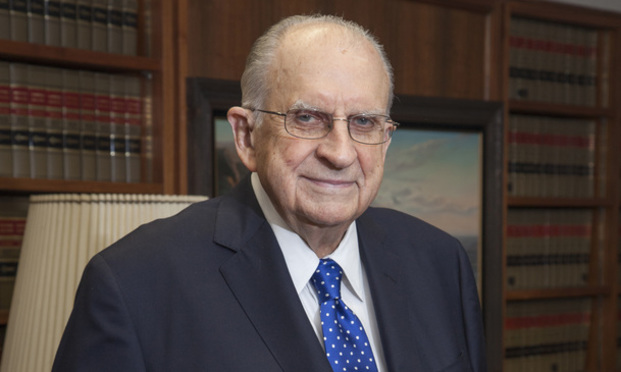5th Circuit Vacates Trucker's Immigrant-Smuggling Conviction After Government Witnesses Don't Show for Trial
In a divided opinion, the U.S. Court of Appeals for the Fifth Circuit has reversed the alien-smuggling conviction of a trucker because he wasn't allowed to confront two undocumented immigrant witnesses who testified for the government via videotape but couldn't be located in Mexico to appear for trial.
December 18, 2018 at 04:01 PM
5 minute read
 Fifth Circuit Judge Tom Reavley in Houston, Texas. Photo by John Everett.
Fifth Circuit Judge Tom Reavley in Houston, Texas. Photo by John Everett.
In a divided opinion, the U.S. Court of Appeals for the Fifth Circuit has reversed the alien-smuggling conviction of a trucker because he wasn't allowed to confront two undocumented immigrant witnesses who testified for the government via videotape but couldn't be located in Mexico to appear for trial.
The decision, USA v. Foster, concerns the appeal of truck driver George Lamar Darryl Foster, who was arrested in 2016 for conspiracy to transport aliens after U.S Border Patrol agents discovered five undocumented immigrants inside his tractor-trailer.
According to the court, two of the undocumented immigrants, Jose Manuel Francisco-Maldonado and Leandro Hernandez-Ruiz, both submitted video depositions to the government in which they identified Foster as the driver of the tractor-trailer. During their depositions, both men were advised that they might be needed for trial and, if so, the government would allow them to re-enter the United States and would pay for their travel expenses. Both were asked to provide contact information, and Francisco-Maldonado provided a home address and a telephone number, while Hernandez-Ruiz provided a home address and an email address.
In exchange for their testimony, the government agreed to drop all criminal charges against Francisco-Maldonado and Hernandez-Ruiz, the court noted. The week before Foster's trial, the government filed a motion to declare both witnesses unavailable and to allow for the introduction of their videotaped depositions at trial. According to the motion, the federal agent assigned to keep track of the witnesses could not locate them in Mexico after making numerous attempts over a four-month period.
Foster filed a motion to exclude the videotaped depositions on the grounds that their introduction would violate his Sixth Amendment right to confront the witnesses against him and that the government had failed to demonstrate that the witnesses were unavailable, a motion the district court denied.
At trial, the Border Patrol agents who arrested Foster also testified against him, while Foster testified in his own defense, claiming he did not know the undocumented immigrants were in his trailer and that he was allegedly threatened and coerced by investigators during an interview.
The jury found Foster guilty. He was later sentenced to 57 months in prison, to be followed by two years of supervised release. Foster appealed his conviction to the Fifth Circuit, alleging the district court violated his Sixth Amendment confrontation rights by allowing the videotaped depositions to be presented at trial in lieu of live testimony.
In their split decision, the Fifth Circuit noted that the main question in the case was whether the government demonstrated that the witnesses were “unavailable.” Witnesses can only be declared unavailable for Confrontation Clause purposes if prosecutorial authorities have made a good-faith effort to obtain their presence at trial.
“In this case we hold that the government's efforts to secure the presence of Hernandez-Ruiz and Francisco-Maldonado do not meet the good-faith standard,” wrote Senior Judge Thomas Reavley in a decision that vacated Foster's sentence and remanded his case for a new trial.
“The government made no attempt to verify or confirm the authenticity or workability of the witnesses' contact information, or offer the option of remaining in the United States pending Foster's trial,” Reavley continued. “Instead, the government merely informed Hernandez-Ruiz and Francisco-Maldonado that their testimony might be needed if Foster's case went to trial and that it would take care of travel arrangements if that turned out to be the case. Most critically, however, after the government released the material witnesses, it failed to remain in contact with them.”
Judge Stephen Higginson dissented in the opinion, disagreeing with the majority's conclusion that the government failed to engage in good-faith efforts to ensure the witnesses' availability for trial. He noted that the government secured the witnesses' assurances that they would return for trial with their lawyers present and under oath.
“Thereafter, the government began its efforts to contact the witnesses as soon as the district court set a trial date, and made multiple attempts to reach each witness,” Higginson wrote. “Although it may be a better practice to remain in continuous contact with material witnesses after they leave the country, the three-and-a-half months that elapsed between the witnesses' depositions and the government's first attempts to contact them was not an unreasonably long period of time.”
Angie Raba, an assistant U.S. attorney in the Western District of Texas who represented the government on appeal, did not return a call for comment.
Ruben P. Morales, an El Paso attorney who represents Foster, was pleased with the decision which he believes will force the government to take more steps before declaring a deported witness is unavailable for trial.
“They can't just deport them and send them down the road. Ideally, you want them to be able to testify,” said Morales, who was recently elected to El Paso County Court at Law No. 7 and notes that Foster's appeal is one of the last cases he's handling before taking the bench next year.
“In this case, they took down a phone number and an address, but they didn't check it,” Morales said of the government agent assigned to tracking the witnesses. “It doesn't set a huge barrier to continue using the video depositions but they have to try harder to insure that this person will come back to court.”
This content has been archived. It is available through our partners, LexisNexis® and Bloomberg Law.
To view this content, please continue to their sites.
Not a Lexis Subscriber?
Subscribe Now
Not a Bloomberg Law Subscriber?
Subscribe Now
NOT FOR REPRINT
© 2025 ALM Global, LLC, All Rights Reserved. Request academic re-use from www.copyright.com. All other uses, submit a request to [email protected]. For more information visit Asset & Logo Licensing.
You Might Like
View All

Eversheds Sutherland Adds Hunton Andrews Energy Lawyer With Cross-Border Experience
3 minute read
Ex-Marathon General Counsel Takes Legal Reins of Another Energy Company

After Nearly 2 Decades in the Role, Longtime Haynes and Boone General Counsel Passes the Baton
3 minute readTrending Stories
- 1People in the News—Jan. 10, 2025—Lamb McErlane, Saxton & Stump
- 2How I Made Partner: 'Be Open With Partners About Your Strengths,' Says Ha Jin Lee of Sullivan & Cromwell
- 3Essential Labor Shifts: Navigating Noncompetes, Workplace Politics and the AI Revolution
- 4The Coordinate Jurisdiction Rule on Insurance Bad Faith Litigation
- 5South Carolina Physicians Challenge Abortion Ban Under Religious Freedom Claims
Who Got The Work
Michael G. Bongiorno, Andrew Scott Dulberg and Elizabeth E. Driscoll from Wilmer Cutler Pickering Hale and Dorr have stepped in to represent Symbotic Inc., an A.I.-enabled technology platform that focuses on increasing supply chain efficiency, and other defendants in a pending shareholder derivative lawsuit. The case, filed Oct. 2 in Massachusetts District Court by the Brown Law Firm on behalf of Stephen Austen, accuses certain officers and directors of misleading investors in regard to Symbotic's potential for margin growth by failing to disclose that the company was not equipped to timely deploy its systems or manage expenses through project delays. The case, assigned to U.S. District Judge Nathaniel M. Gorton, is 1:24-cv-12522, Austen v. Cohen et al.
Who Got The Work
Edmund Polubinski and Marie Killmond of Davis Polk & Wardwell have entered appearances for data platform software development company MongoDB and other defendants in a pending shareholder derivative lawsuit. The action, filed Oct. 7 in New York Southern District Court by the Brown Law Firm, accuses the company's directors and/or officers of falsely expressing confidence in the company’s restructuring of its sales incentive plan and downplaying the severity of decreases in its upfront commitments. The case is 1:24-cv-07594, Roy v. Ittycheria et al.
Who Got The Work
Amy O. Bruchs and Kurt F. Ellison of Michael Best & Friedrich have entered appearances for Epic Systems Corp. in a pending employment discrimination lawsuit. The suit was filed Sept. 7 in Wisconsin Western District Court by Levine Eisberner LLC and Siri & Glimstad on behalf of a project manager who claims that he was wrongfully terminated after applying for a religious exemption to the defendant's COVID-19 vaccine mandate. The case, assigned to U.S. Magistrate Judge Anita Marie Boor, is 3:24-cv-00630, Secker, Nathan v. Epic Systems Corporation.
Who Got The Work
David X. Sullivan, Thomas J. Finn and Gregory A. Hall from McCarter & English have entered appearances for Sunrun Installation Services in a pending civil rights lawsuit. The complaint was filed Sept. 4 in Connecticut District Court by attorney Robert M. Berke on behalf of former employee George Edward Steins, who was arrested and charged with employing an unregistered home improvement salesperson. The complaint alleges that had Sunrun informed the Connecticut Department of Consumer Protection that the plaintiff's employment had ended in 2017 and that he no longer held Sunrun's home improvement contractor license, he would not have been hit with charges, which were dismissed in May 2024. The case, assigned to U.S. District Judge Jeffrey A. Meyer, is 3:24-cv-01423, Steins v. Sunrun, Inc. et al.
Who Got The Work
Greenberg Traurig shareholder Joshua L. Raskin has entered an appearance for boohoo.com UK Ltd. in a pending patent infringement lawsuit. The suit, filed Sept. 3 in Texas Eastern District Court by Rozier Hardt McDonough on behalf of Alto Dynamics, asserts five patents related to an online shopping platform. The case, assigned to U.S. District Judge Rodney Gilstrap, is 2:24-cv-00719, Alto Dynamics, LLC v. boohoo.com UK Limited.
Featured Firms
Law Offices of Gary Martin Hays & Associates, P.C.
(470) 294-1674
Law Offices of Mark E. Salomone
(857) 444-6468
Smith & Hassler
(713) 739-1250






